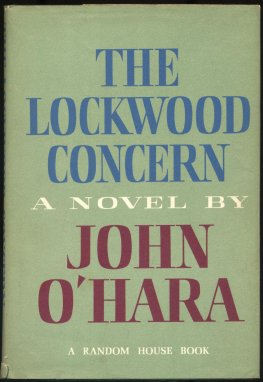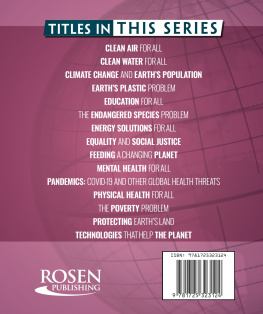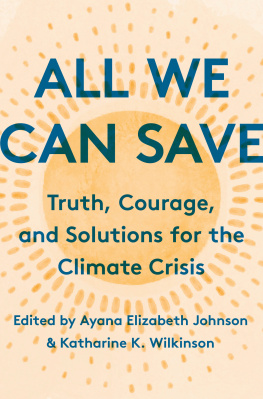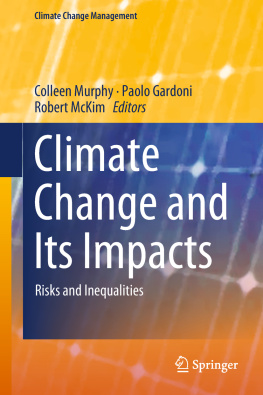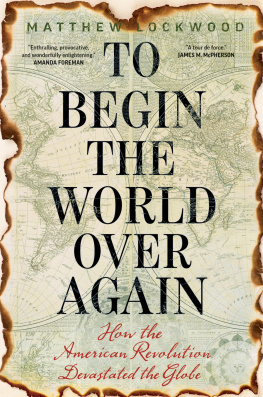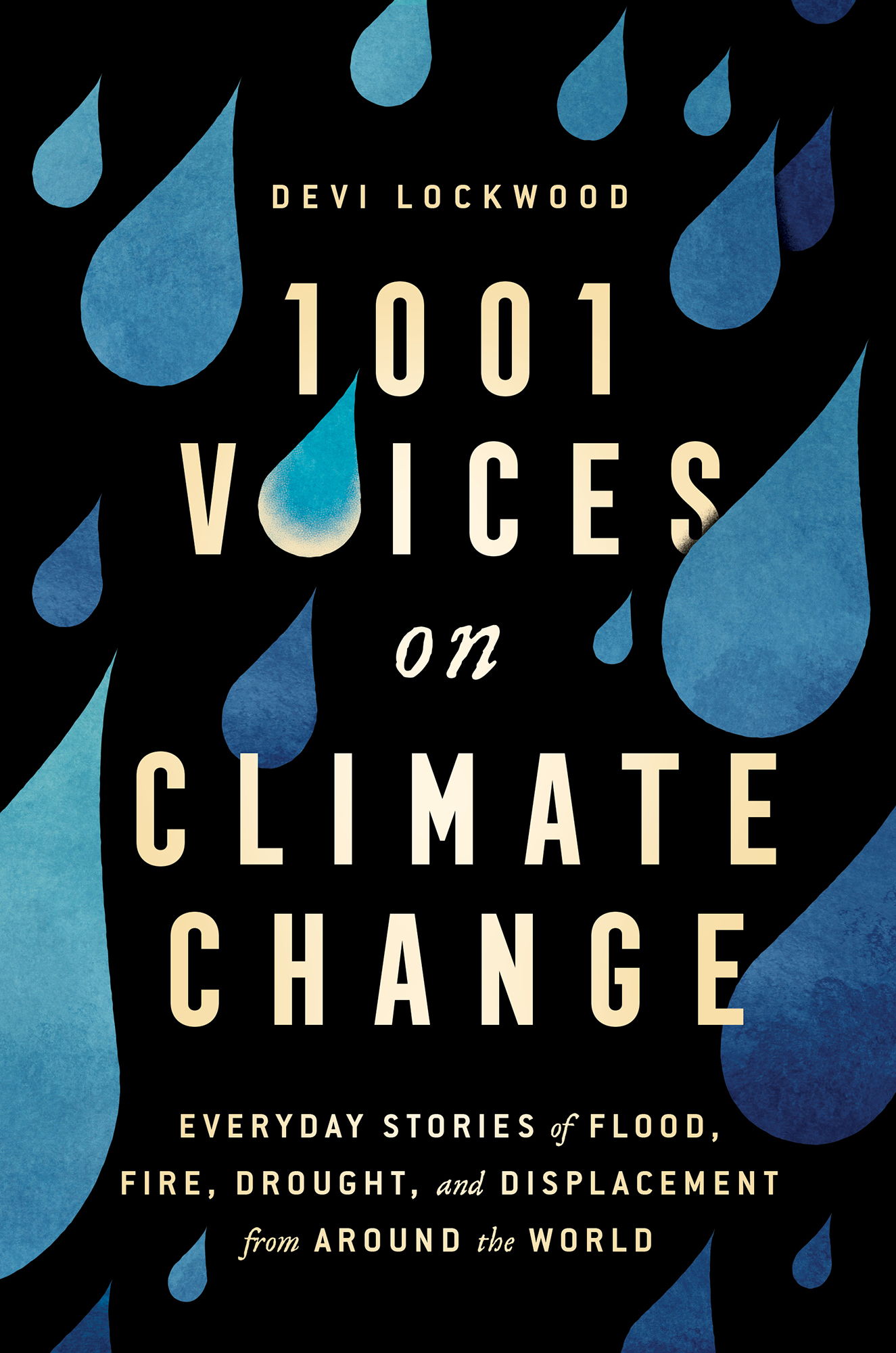Contents
Guide
Devi Lockwood
1,001 Voices on Climate Change
Everyday Stories of Flood, Fire, Drought, and Displacement from Around the World
ADVANCE PRAISE for 1,001 VOICES on CLIMATE CHANGE
A hybrid of travel literature and oral history, Lockwood somehow shrinks the ungraspably vast problem of climate change down to a human scale, then patiently, carefully combines those individual voices into a planetary chorus. A monumental achievement.
Robert Moor, bestselling author of On Trails: An Exploration
Tell me a story. Is there a more fundamentally human sentence than that? Devi Lockwood circles the globe, seeking peoples experiences with water and climate change, from cultural myths to rising seas impacts on daily life to one womans pain, tuned to the voices of the trees. Lockwood seeks and you, dear reader, shall find.
Erica Gies, environmental journalist, science journalist, and author of the upcoming book Water Always Wins: Going with the Flow to Thrive in an Age of Droughts, Floods, and Climate Change
In a world that needs more listening and more storytelling, Devi Lockwood covers the waterfront. This is an empathetic and beautiful book.
Richard Louv, author of The Nature Principle and Our Wild Calling
This dazzling and significant collection captures the voices of people around the world, from Tuvalu to Thailand, from Australia to Kazakhstan, who are experiencing firsthand the life-altering effects of climate change. Lockwoods approach to recounting their stories is compassionate and impassioned, focused as much on the tiny details of life as the larger planetary changes afoot in her interviewees own backyards. 1,001 Voices on Climate Change is beautiful and necessary reading.
Amy Brady, executive director of Orion
As the fight against climate change accelerates, Devi Lockwood reminds us why. 1,001 Voices on Climate Change records vivid stories from those already living through the climate crisis. Lockwood takes us to every corner of the world to remind us to stop and listen. It is a compelling snapshot of this moment.
Samantha Montano, PhD, author of Disasterology: Dispatches from the Frontlines of the Climate Crisis and assistant professor of emergency management at Massachusetts Maritime Academy
In this book, Devi illuminates the human stories the world so desperately needs. Devis gift is in meeting people as they are and pulling out the essence of their stories in such a way that speaks louder than words. It is not with spreadsheets, graphs, and technology that we will overcome the challenges of climate change, but with a transformation of our culture through story.
Alina Siegfried, author, narrative specialist, spoken word artist, and systems change advocate
A great storyteller needs first to be a great listener, and with each pedal of her bikeup and down previously unknown pathsDevi Lockwood hears from those living climate change and related water woes literally on the front lines. Her skills at storytelling are matched by her mastery of listening. The results are riveting.
Bud Ward, editor, Yale Climate Connections
For all the storytellers
INTRODUCTION
MARATHON
When I listen, the whole world widens.
I first felt the need to listen to strangers after the bombs. Two of them, pressure cookers filled with nails, exploded at the Boston Marathon finish line, killing three people, injuring 260.
Marathon Monday is a holiday in Boston; my professors had canceled their classes. On April 15, 2013, I rode my bicycle to Coolidge Corner to cheer on the runners. It was my first time watching a marathon up close. I pushed my bicycle as close as I could to the racecourse. Following the queue of people next to me, I dismounted and called out the names of athletes written on their shirts and arms.
Go, Jason! Yes, Hannah! You got this, Raquel!
They pumped their fists back in gratitude, smiling through pain. The raw human emotion, the joy of it, overwhelmed me. After an hour of cheering, I turned my bicycle north and rode over the I-90 overpass back to Harvard. My rowing coach, Michiel Bartman, was the first to alert me that something was wrong.
You should come home if you havent already, he texted. Something about explosions near mile 26.
I stared at my phone, shaken. How could someone hijack that joy? What could they have been thinking?
A few days later, Massachusetts governor Deval Patrick ordered all Boston residents to shelter in place, putting the city on lockdown. The streets of Cambridge were silent, empty. Occasionally a helicopter passed overhead, whipping up the air. A siren tore down a nearby street.
In my cooperative house of thirty-two students, everyone was anxious, jittery. Someone prepared a big pot of pasta, which we ate without looking at each other. After dinner we kept to our rooms, not wanting to see our fear reflected back at us.
CARDBOARD
When the lockdown lifted, all I wanted was to go outside: to walk and breathe and hear the sounds of other people. I craved looking at fellow human beings, face-to-face, without flinching. I needed to connect, to remind myself that not everyone is murderous.
The Wednesday after the marathon, biking home from campus, I found a bunch of blue and green balloons on the lawn of the Cambridge Public Library, left over from a Cambridge Science Festival event.
Please take these, someone said, handing me the orange ribbon at the base of the balloons. I tied the bunch to the back of my bicycle and pedaled off.
In the kitchen, I poked around under the sink and disassembled a broccoli box. I found a paper grocery bag, cut it open, and taped the inside of the bag over the surface of the cardboard rectangle, covering up the vegetable companys logo to create a sign of my own. Next, I cut two holes in the top edge of the cardboard sign. I threaded a piece of polka-dot ribbon through the holes, tying knots and adjusting the length around my neck so that the sign fell over my chest. Open call for stories, I wrote in Sharpie.
The next morning, I left the house early with the cardboard sign around my neck, the bunch of balloons in hand (to draw attention to myself, I reasoned), and an audio recorder in my pocket.
I remember the air was coola spring kind of cool that blushes with the promise of almost-warmth. As I walked with my sign, the streets I thought I knew transformed. Suddenly, every step was laden with possibilities. I could talk to anyone! Why not?
People stared at me, and my sign, and my balloons. Some paused long enough to make eye contact. Some approached me.
Open call for stories? they asked, reading my sign. What does that mean?
Do you have a story to share? I asked.
What kind of story? they said.
Any kind, I replied. And would it be okay if I make an audio recording?
I met homeless Vietnam vets. A woman who lost everyone on her block to the earthquake in Haiti and was wearing a Lady Liberty costume, holding a sign advertising parking. I met a transit police officer who swore that his mother was dead for forty-eight hours and came back to life after he prayed, asking if he could just have one more coffee with her. A twentysomething on his way to a bar busted out a rap dedicated to me and my sign right there on the streeta friend backed him up with beatboxing. An inquisitive psychologist wanted to know what other people were telling me. One man told me his best friend was a clown. Another was worried about his friend who was making a choice between grad school in one city and a girlfriend in another. A woman who had written a poem that morning pulled it out of her purse to read it to me. A retired Spanish teacher swore to me that the Statue of Liberty was modeled after Marie Antoinette.


